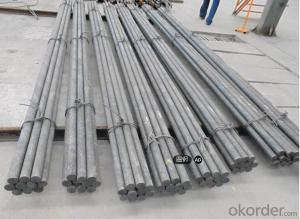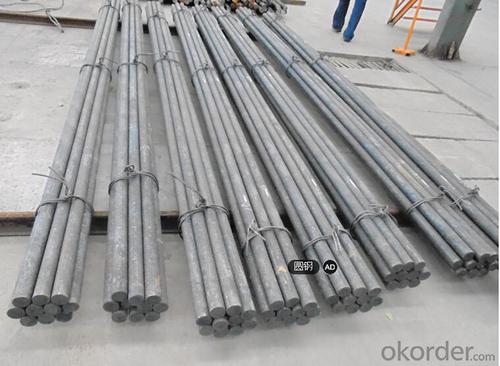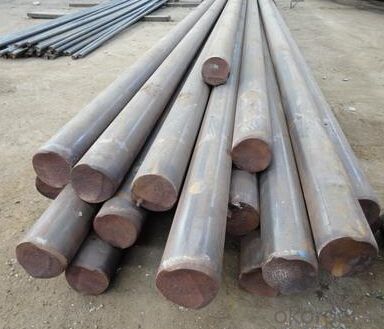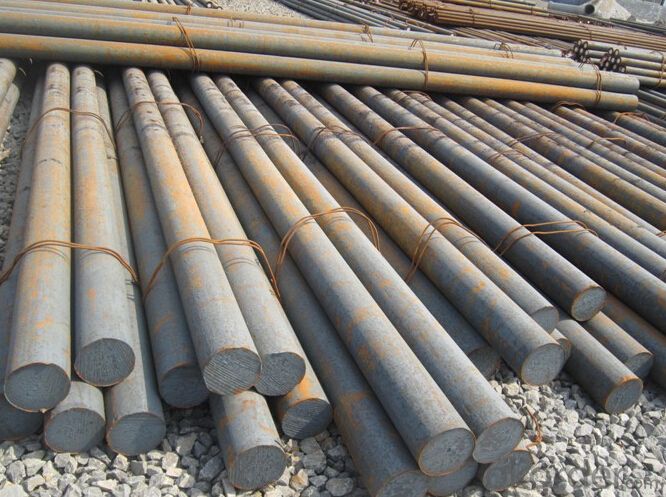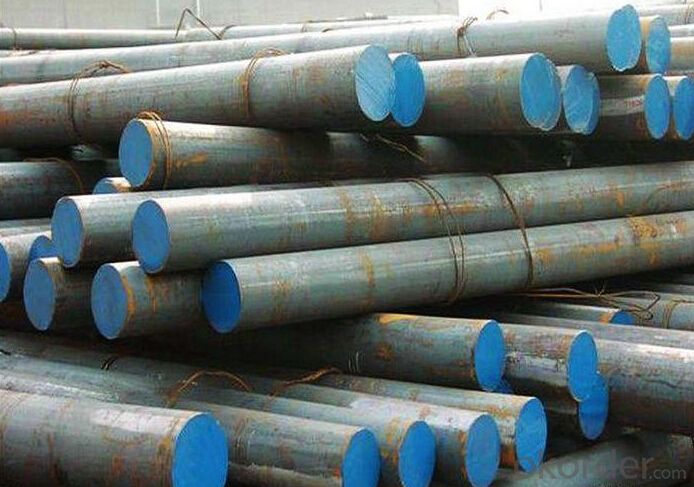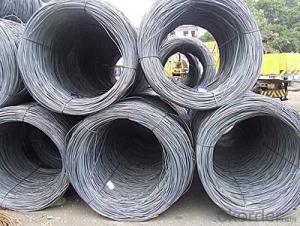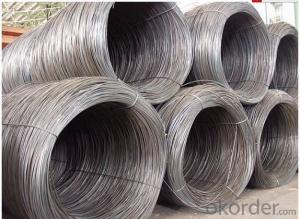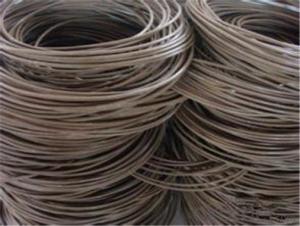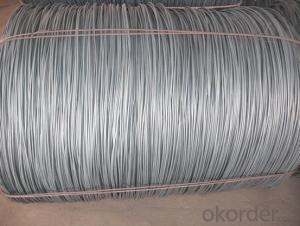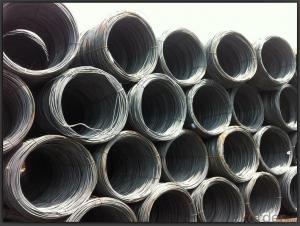16MNCR5 Steel Rod Hot Rolled and Rold Rolled
- Loading Port:
- Qingdao
- Payment Terms:
- TT OR LC
- Min Order Qty:
- 5 m.t.
- Supply Capability:
- 100000 m.t./month
OKorder Service Pledge
Quality Product, Order Online Tracking, Timely Delivery
OKorder Financial Service
Credit Rating, Credit Services, Credit Purchasing
You Might Also Like
Specification
Type:
Carbon Steel,Spring Steel,Bearing Steel,Gear Steel,Deformed Steel,Stainless Steel,Alloy Steel
Shape:
Steel Coil,Steel Sheet,Steel Wire Rod,Steel Flat Bar,Steel Square Bar,Steel Angle,Steel Round Bar,Steel Billets
Technique:
Hot Rolled,Cold Rolled,Cold Drawn,ERW,Forged,Saw,Extruded,EFW,Spring
Surface Treatment:
Galvanized,Coated,Copper Coated,Color Coated,Oiled,Dry,Chromed Passivation,Polished,Bright,Black,PVDF Coated
Certification:
ISO,SGS,BV,IBR,RoHS,CE,API,BSI,UL
Thickness:
5-550mm
Width:
5-550mm
Length:
6-12m
Outer Diameter:
5-550mm
Net Weight:
100
Packaging:
seaworthy packaging
16MNCR5 Steel Rod Hot Rolled and Rold Rolled
Detailed Information of 16MNCR5 Steel Rod Hot Rolled and Rold Rolled
| Name | Steel Round Bar |
| Shape | Round Bar/Square Bar/Flat Bar/Plate/Wire |
| Standard | GB/ASTM/SAE/AISI/DIN/JIS/EN/BS |
| Surface Treatment: | Black/Peeling/Polished/Machined |
| Delivery Condition: | Hot Rolled or Forged/Peeled or Black Surface |
| Test | SGS/UT 100% Elements Testing |
| Certificate: | ISO/Mill Certificate |
| Service: | 24 hours online service / |
| more than 20 years trading and manufacture | |
| Quality Assurance: | the third party inspection, such as SGS, BV, TUV…etc. is acceptable |
| Packaging Details: | Seaworthy Packaging or as per customer's packing instruction |
Product Overviews of 16MNCR5 Steel Rod Hot Rolled and Rold Rolled
| Product Name | Typical Grades | Diameter(mm) | Standard Adopted |
| Carbon Steel | 20 (1020/S20C/C22) | ||
| 40 (1040/S40C/C40) | Ø16-Ø300 | ||
| 45 (1045/S45C/C45) | |||
| Bearing Steel | GCr9 (51100/SUJ1) | ||
| GCr15 (52100/SUJ2/100Gr6) | Ø12-Ø250 | ||
| GCr9SiMn (A485-Gr.1/SUJ3) | GB/SAE/ | ||
| Cr-Mo Steel | 20Cr (5120/SCr420H/20Cr4) | JIS/DIN | |
| 40Cr (5140/SCr440/41Cr4) | Ø12-Ø250 | ||
| 42CrMo(4140/SCM440/42CrMo4) | |||
| Gear Steel | 20CrNiMo | ||
| 20CrMn(5115/SMnC420/20MnCr5) | Ø16-Ø600 | ||
| 20CrNiMo(8620/SNCM220/20CrMiMo2) |
Company Introduction of 16MNCR5 Steel Rod Hot Rolled and Rold Rolled
CNBM International Corporation is the most import and export platform of CNBM group(China National Building Material Group Corporation) ,which is a state-owned enterprise, ranked in 270th of Fortune Global 500 in 2015.
With its advantages, CNBM International are mainly concentrate on Cement, Glass, Iron and Steel, Ceramics industries and devotes herself for supplying high quality series of refractories as well as technical consultancies and logistics solution.
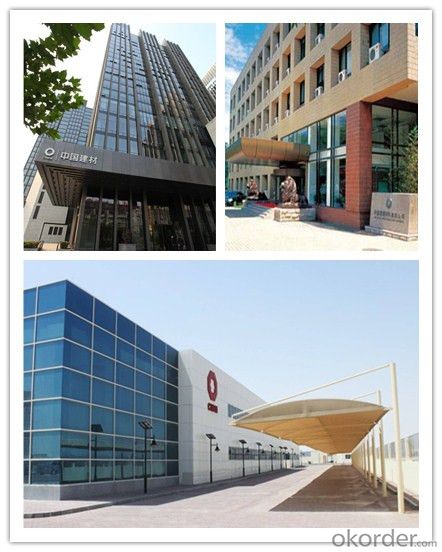
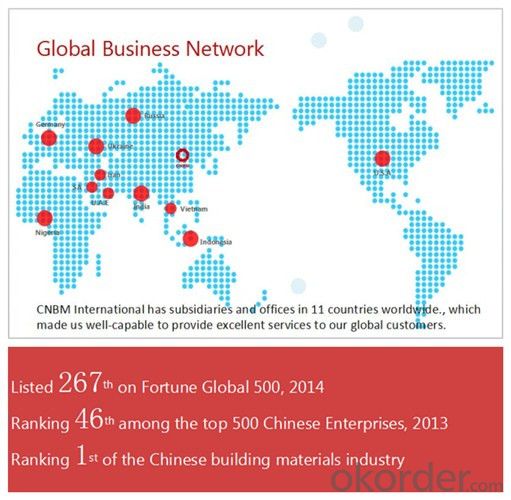
| After-sale service | l CNBM provides the services and support you need for every step of our cooperation. We’re the business partners you can trust; you can relax and get on with doing business. |
| l For any problem, please kindly contact us at any your convenient time, we’ll reply you in our first priority within 24 hours | |
| Advantages | l Industry experience over 20 years. |
| l Shipment of goods -More than 70 countries worldwide. | |
| l The most convenient transport and prompt delivery. | |
| l Competitive price with best service. | |
| l High technical production line with top quality products. | |
| l High reputation based on best quality products. | |
Packaging & Delivery of 16MNCR5 Steel Rod Hot Rolled and Rold Rolled
| Packaging Detail | Sea worthy packing /as per customer's packing instruction |
| Delivery Detail | 15 ~ 40 days after receiving the deposit |
Products Show
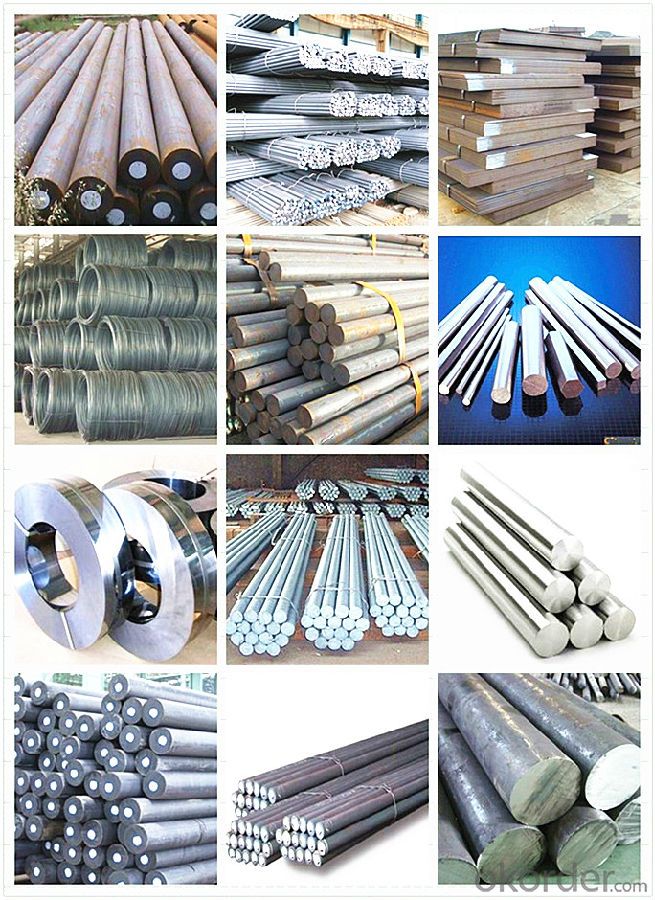
FAQ:
| Are you a trading company or manufacturer? | Manufacturer |
| What’s the MOQ? | 1000m2 |
| What’s your delivery time? | 15-20 days after downpayment received |
| Do you Accept OEM service? | Yes |
| what’s your delivery terms? | FOB/CFR/CIF |
| What's the Payment Terms? | 30% as deposit,70% before shipment by T/T |
| Western Union acceptable for small amount. | |
| L/C acceptable for large amount. | |
| Scrow ,Paybal,Alipay are also ok | |
| Why choose us? | Chose happens because of quality, then price, We can give you both. Additionally, we can also offer professional products inquiry, products knowledge train (for agents), smooth goods delivery, excellent customer solution proposals. |
| What's your available port of Shipment? | Main Port, China |
| What’s your featured services? | Our service formula: good quality+ good price+ good service=customer's trust |
| Where are your Market? | Covering more than 160 countries in the world |
- Q: What are the different methods of surface finishing for special steel?
- Special steel can be finished using various methods, each with its own advantages and the ability to meet specific aesthetic or functional needs. Some commonly utilized techniques include: 1. Electroplating: Through an electrochemical reaction, a layer of metal is deposited onto the surface of the special steel. This process enhances corrosion resistance, improves appearance, and can increase hardness or wear resistance. 2. Passivation: A chemical treatment is employed to eliminate surface contaminants and form a thin oxide layer on the special steel. This treatment enhances corrosion resistance by preventing rust or other oxidation products from forming. 3. Polishing: Utilizing abrasive materials, a mechanical process is employed to remove a thin layer of the steel surface, resulting in a smooth and glossy finish. This method is often used to enhance the appearance of special steel products or achieve a desired level of reflectivity. 4. Shot blasting: Tiny metal beads or shots are propelled at high speeds onto the surface of the special steel. This technique removes scale, rust, or other surface contaminants, resulting in a clean and textured finish. Shot blasting is commonly employed to prepare the steel for subsequent coating or painting applications. 5. Physical vapor deposition (PVD): A vacuum-based coating process is used to deposit a thin layer of material onto the special steel surface. This method offers excellent adhesion, wear resistance, and the ability to provide various colors or finishes to enhance the steel's aesthetics. 6. Powder coating: Dry powder is applied onto the special steel surface and then cured under heat to form a protective and decorative layer. This method offers excellent corrosion resistance, durability, and a wide range of color options. 7. Anodizing: An electrolytic process is employed to create a controlled oxide layer on the surface of specific special steel alloys. This process increases corrosion resistance, improves appearance, and can enhance hardness or wear resistance. These methods are just a selection of the numerous options available for surface finishing special steel. The choice of method will depend on factors such as the desired finish, functional requirements, and the specific properties of the steel being used.
- Q: What are the common applications of special steel in the manufacturing industry?
- Special steel, also known as alloy steel, is widely used in the manufacturing industry due to its unique properties and superior performance in various applications. Some common applications of special steel in the manufacturing industry include: 1. Automotive Industry: Special steel is extensively used in the manufacturing of automobile components such as engine parts, gears, axles, and crankshafts. The high strength, durability, and resistance to wear and corrosion make special steel an ideal choice for these critical automotive applications. 2. Aerospace Industry: Special steel plays a vital role in the aerospace sector, where it is used for manufacturing aircraft components like landing gear, turbine blades, and structural parts. The high tensile strength, lightweight nature, and ability to withstand extreme temperatures make special steel indispensable for ensuring the safety and efficiency of aircraft operations. 3. Construction Industry: Special steel finds widespread use in the construction sector for manufacturing structural elements like beams, columns, and reinforcement bars. The superior strength, ductility, and resistance to external forces make special steel an essential material for ensuring the structural integrity and safety of buildings, bridges, and other infrastructure projects. 4. Oil and Gas Industry: Special steel is extensively utilized in the oil and gas industry for manufacturing pipelines, drill bits, valves, and other equipment. The high resistance to corrosion, pressure, and extreme temperatures make special steel suitable for handling the harsh operating conditions encountered in oil and gas exploration, extraction, and transportation. 5. Tool and Die Making: Special steel is commonly employed in tool and die making due to its excellent hardness, toughness, and wear resistance. It is used for manufacturing cutting tools, molds, dies, and punches required in various industries such as automotive, aerospace, and consumer goods manufacturing. 6. Medical Industry: Special steel finds applications in the manufacturing of surgical instruments, implants, and medical devices. The biocompatibility, corrosion resistance, and sterilizability of special steel make it an ideal material for ensuring the safety and effectiveness of medical tools and implants. These are just a few examples of the common applications of special steel in the manufacturing industry. The versatility, reliability, and performance of special steel make it a preferred material choice in numerous other sectors, contributing to the advancement and growth of various manufacturing processes.
- Q: What are the unique properties of stainless steel?
- Stainless steel has several unique properties that make it highly desirable in various applications. Firstly, it has excellent corrosion resistance, making it resistant to rust and staining, even in harsh environments. Additionally, stainless steel is durable and can withstand high temperatures, making it suitable for use in extreme conditions. It also has a high strength-to-weight ratio, making it strong yet lightweight. Moreover, stainless steel is hygienic and easy to clean, making it ideal for use in food processing and medical equipment. Lastly, stainless steel has an attractive appearance and can be easily fabricated into different shapes, making it a versatile material for various industries.
- Q: How is special steel used in the manufacturing of consumer goods?
- Special steel is used in the manufacturing of consumer goods in various ways. One of the key applications is in the production of high-quality kitchen knives and utensils. Special steel, such as Damascus steel or stainless steel, is preferred for its exceptional strength, durability, and corrosion resistance. These properties ensure that the consumer goods made from special steel can withstand the demands of everyday use, retain their sharpness for longer periods, and resist rust and staining. Another significant use of special steel in consumer goods manufacturing is in the production of watch components. Special steel, particularly stainless steel, is widely used in the manufacturing of watch cases, bezels, and bracelets due to its appealing aesthetics and resistance to scratches and tarnishing. Additionally, special steel alloys are often used for the production of watch springs, which require high strength, elasticity, and resistance to fatigue. Furthermore, special steel finds application in the manufacturing of consumer goods like automotive parts, hand tools, and firearms. In the automotive industry, special steel is used for producing engine components, chassis parts, and suspension systems, among others. The high strength, impact resistance, and heat resistance of special steel make it suitable for these applications, ensuring the durability and reliability of consumer goods. Special steel also plays a crucial role in the production of hand tools, such as wrenches, pliers, and screwdrivers. These tools require strong and durable materials to withstand the forces applied during use. Special steel meets these requirements, providing the necessary strength and resistance against wear and tear. Lastly, special steel is utilized in the manufacturing of firearms, where it is highly valued for its strength, impact resistance, and heat resistance. Firearms need to withstand high pressures and temperatures generated during firing, making special steel an ideal choice for barrels, chambers, and other critical components. In summary, special steel is used in the manufacturing of consumer goods such as kitchen utensils, watches, automotive parts, hand tools, and firearms. Its exceptional properties, including strength, durability, corrosion resistance, and heat resistance, make it a preferred material for these applications, ensuring high-quality and long-lasting products for consumers.
- Q: How does special steel perform in welding applications?
- Special steel performs well in welding applications due to its high strength, excellent heat resistance, and superior weldability. Its unique composition and alloying elements allow for precise control of the welding process, resulting in high-quality, durable welds. Additionally, special steel's ability to resist cracking and deformation during welding ensures reliable performance and structural integrity in various applications.
- Q: How does special steel contribute to improving product resistance to environmental factors?
- Special steel contributes to improving product resistance to environmental factors in several ways. Firstly, special steel alloys often have enhanced corrosion resistance, protecting the product from damage caused by exposure to moisture, chemicals, and other corrosive substances present in the environment. Additionally, special steel can offer improved strength and durability, enabling the product to withstand harsh conditions such as extreme temperatures, high pressure, or mechanical stress. Furthermore, special steel can exhibit excellent fatigue resistance, ensuring that the product maintains its structural integrity even after prolonged exposure to cyclic loading or repetitive stress. Overall, the unique characteristics of special steel make it a valuable material for enhancing the resistance of products to various environmental factors, ultimately prolonging their lifespan and reducing maintenance costs.
- Q: What is the role of chromium in special steel?
- The unique properties and characteristics of chromium are crucial in special steel. It is added primarily to steel alloys to enhance their corrosion resistance, durability, and strength. One significant contribution of chromium is its ability to form a passive oxide layer called chromium oxide on the steel's surface. This layer acts as a protective barrier, preventing corrosive elements like oxygen and moisture from reaching the steel. The corrosion resistance of chromium-containing steel makes it highly suitable for harsh environments, such as the marine or chemical industries. Moreover, chromium improves the mechanical properties of steel. It increases hardness, toughness, and wear resistance, making it valuable in manufacturing tools, machinery components, and other applications that require strength and durability. Chromium also helps retain sharpness and edge retention, making it ideal for high-quality knives and blades. Additionally, chromium is essential in heat-resistant steel alloys as it significantly improves the material's ability to withstand high temperatures without losing strength or shape. This makes it suitable for applications in turbine blades, exhaust systems, and aerospace components. In conclusion, chromium plays a vital role in special steel by enhancing corrosion resistance, improving mechanical properties, and enabling high-temperature resistance. These properties make chromium-containing steel alloys highly valuable and versatile in various industries and applications.
- Q: What are the specific requirements for special steel used in the power transmission industry?
- The durability, strength, and resistance to various environmental factors are crucial requirements for special steel used in the power transmission industry. Power transmission equipment operates under high loads, extreme temperatures, and corrosive conditions, making these requirements essential. Here are some specific requirements for special steel in this industry: 1. High strength is necessary for the steel to withstand the mechanical stresses and loads imposed by power transmission equipment. This ensures effective weight carrying and resistance to deformation or failure. 2. Sufficient hardness is needed to resist wear and abrasion. The constant friction and contact in power transmission equipment require steel that can withstand these forces without quick deterioration. 3. Excellent resistance to corrosion and rusting is crucial due to the frequent exposure of power transmission equipment to moisture, chemicals, and other corrosive substances. The steel must withstand these conditions without deteriorating. 4. High heat resistance is necessary as power transmission equipment operates at high temperatures, especially in power generation and distribution. This prevents deformation, strength loss, and failure under extreme thermal conditions. 5. Good electrical conductivity is required for certain power transmission components to ensure efficient electricity transmission. Steel used for conductive purposes must have low electrical resistance to minimize power loss during transmission. 6. Excellent fatigue resistance is important for special steel used in the power transmission industry. This means the steel can withstand repeated cycles of stress and strain without cracking or breaking, ensuring long-term reliability and durability. 7. Dimensional stability is crucial for the steel to maintain its intended design and functionality over time, even under different operating conditions. In conclusion, the specific requirements for special steel in the power transmission industry include high strength, hardness, corrosion resistance, heat resistance, electrical conductivity, fatigue resistance, and dimensional stability. These requirements allow the steel to withstand demanding operational conditions and provide reliable and efficient power transmission.
- Q: How does special steel contribute to the nuclear industry?
- Special steel plays a crucial role in the nuclear industry by offering unique properties such as high strength, heat resistance, and corrosion resistance. It is used in critical applications like reactor pressure vessels, steam generators, fuel cladding, and containment structures. The exceptional performance of special steel ensures the safety, reliability, and longevity of nuclear power plants, making it an indispensable material for the industry.
- Q: How does the heat treatment process affect special steel?
- The heat treatment process greatly affects special steel by altering its microstructure and improving its mechanical properties. It involves heating the steel to a specific temperature and then cooling it in a controlled manner. This process can increase the steel's hardness, strength, toughness, and wear resistance, making it suitable for various applications in industries such as automotive, aerospace, and tool manufacturing. Additionally, heat treatment can also enhance the steel's dimensional stability and corrosion resistance, further improving its overall performance.
Send your message to us
16MNCR5 Steel Rod Hot Rolled and Rold Rolled
- Loading Port:
- Qingdao
- Payment Terms:
- TT OR LC
- Min Order Qty:
- 5 m.t.
- Supply Capability:
- 100000 m.t./month
OKorder Service Pledge
Quality Product, Order Online Tracking, Timely Delivery
OKorder Financial Service
Credit Rating, Credit Services, Credit Purchasing
Similar products
Hot products
Hot Searches
Related keywords
